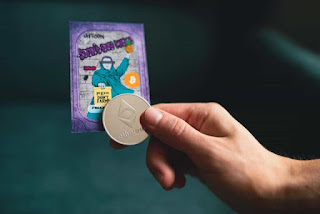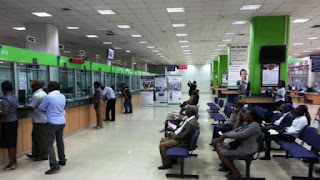Non Fungible Tokens (NFT)
There has been a growing interest in NFTs in the digital space, a lot of buzzes have been generated and many people are going into minting of tokens. Millions of dollars exchanged hands in the sales of NFTs.
You may get confused and wonder if the NFT trend is a fad or if people are just wasting their money and time. This article breaks down the concept of NFTs.
What is NFT?
NFT simply means Non Fungible tokens. The non-fungible part means unique and non-replaceable. No swapping like for like. They are tokens because they are digital and are protected by blockchain technology, just like cryptocurrencies.
You can sell a digital image as an NFT, the same way you would sell a physical painting. When you sell NFTS, you are the owner of the ‘original’ version, and the NFT artist continues to benefit every time the NFT is resold.
Many digital artists have sold their digital arts with this technology.
Because they are “non-fungible”, they are different from other blockchain tokens, such as Ethereum, which are fungible. This characteristic is why NFTS are the perfect model for dealing with digital art and other valuables in the online space.
This uniqueness is why NFTS cannot be exchanged for similar tokens that are equivalent. So, while 1 bitcoin can be swapped for 1 bitcoin, NFTs cannot be swapped because of their unique nature and also because they don’t have similar values.
This also implies that NFTS can’t be used in business transactions as an exchange standard because none of any two NFTs is alike. The worth of each NFT depends largely on the perception of it by the world and the level of demand for it.
What is the origin of NFT?
The earliest example of NFTs on the internet is the platform, milliondollarhomepage.com by Alex Tew from 2005. However, it was not based on a blockchain but had attributes of NFTs. The website offered different pixels totaling 1 million in number for sale.
Then came the advent of coloured coins in the year 2012. This utilized the blockchain of bitcoin. However, it didn’t make much of an impact because the system it was based on was not built to handle substantial NFT features. In 2014, Counterparty came up to fill the gap.
Counterparty gave the framework for Initial Coin Offerings (ICOs), memes, and trading cards to operate. At this time, Ethereum rose in popularity and things gradually shifted to its ecosystem. CryptoKitties emerged in 2017 in the Ethereum ecosystem. Using a blockchain to adopt and raise a digital cat became appealing to the world.
What is a token?
A token can be referred to as a digitalized asset that people can own and transfer to other people. The blockchain secures tokens in a cryptographic system, issuing private keys that are the property of the token owner.
Every token has a public address that is used to identify it. The owner possesses the private keys and uses them to perform some predetermined functions. For example, money can be received at the public address of a bitcoin wallet that everyone can see but you can only use the money in the wallet using the private keys.
All kinds of information are contained in a token including, images, music files, rights to real estate, motor vehicles, clothing, and other physical properties.
Tokens are designed for many purposes. There are payment tokens, utility tokens, security tokens, etc.
A token can be created on the blockchain by following established protocols. Examples include the simple Ledger protocol or Ethereum’s ERC-20, -721, or -1155 standards.
Fungible Tokens compared to Non-fungible Tokens
Tokens are classified into two major classes:
(i). Fungible
(ii). Non-fungible.
We refer to Fungibility as the ability of an asset or tangible item to be interchanged with an identical item. Paper money for instance is fungible because one can borrow N1000 from a friend and repay with two N500 notes. Once can also repay with another N1000 note that is not the same one that you borrowed.
The value represented by each note is what is important and not the note itself.
Non-fungibility is a uniqueness that cannot be copied or duplicated. There can only be one Lionel Messi, for example. Your ATM card is just yours. You can’t find another card with the same name, same number, and same expiry date.
Whereas you can change a N1000 note into N200 notes in five places, your Atm card is not exchangeable because of its non-fungible quality.
What makes NFTs scarce?
The scarcity of NFT is criticized by some people as being artificially induced, however, it is understandable that a non-fungible item is very likely to be scarce. For example, it is possible for a digital painting that is tokenized to be duplicated many times over. So, while the token might be unique and single, the idea behind it can still be duplicated.
The question arises: What is the use for this? Is it not an unwise decision to own an item that is not truly yours?
A simple answer is that it depends. When you buy a token, it becomes yours but the representation of the token is what matters.
The prices of Non-fungible tokens are going up because more people these days are spending most of their time online and in digital environments. The perception of this increased exposure should lead to an increased demand which drives prices higher.
A second reason is that digital assets can be easily transferred. So, just like one would buy gold, artworks, or real estate to store their wealth, an investor in the same vein can also buy NFTs to store his wealth, and in the future sell them to get his money back.
The demand for NFTs is increasing with their popularity owing to the fact that there is only one version of each token. However this hype is only a thing of the mind, and therefore, anyone who is investing big money on NFTs is simply speculating.
NFTs and copyright
Intellectual property is very important. By law, the original owner of any work is the creator of that work until they transfer that right to another person.
However, you must note that the copyright for a digital work might be included or might not be included in the token. So, if an artist sells an image token to you without the copyright, he or she can still duplicate the same picture several times over and still make them into tokens as well.
If the copyrights to digital art or music are sold to you as an NFT, you can earn royalties from your investment over the years and get tangible returns.
NFTs enabling real estate in the digital space
Real estates in the digital space are now lucrative. Digitally created worlds like Decentraland are putting up plots for sale. But what would anyone gain from buying digital land?
This again is because of thinking that there are going to be more human interactions on the internet. As the demand for land in Decentraland surges, the prices of its plots will also increase. MANA is the official currency of Decentraland, thus the need for it will increase.
This implies that just as people buy physical real estate because of speculation, hoping for a price increase, they do the same thing when buying digital real estate.
What are the benefits of NFTs?
Authenticity: Being based on blockchain technology gives it credibility.
Ownership rights – Transactions are visible to the public and everyone can know the owner
Secure transfer of ownership: This is a result of the framework of blockchain technology.
Ownership of copyright: You can include the copyright of the work into the blockchain.
What are the uses of NFTs?
NFTs are being deployed in various industries and sectors. The ever-expanding uses cases are felt in the following:
Digital Art: The successful reality of the creation of tokens from digital fine art, animations, etc.
Gaming: You can find in-game fashion accessories, real estate, and other products being sold
IRO music use – Musicians can now sell their music rights using NFTS. IRO means Initial Rights Offering.
Assets: NFTs are sold as assets.
Sports memorabilia: NFTs are now being used by sports fans to demonstrate their support and loyalty to their various teams.
Notable NFT projects
Cryptokitties: These are real-life cats growing on the blockchain.
MoonCatRescue: Another cat game on the blockchain.
CryptoKicks – This is patent sportswear owned by Nike.
Decentraland: A digital world with lands owned by users.
NBA Top Shot: This gives you ownership of the best moments in basketball.
FEWOCiOUS x RTFKT sneakers: This product netted $3.1 million in 7 minutes
Beeple’s every day – At Christie’s, this raked in $69 million.
Conclusion
Non-Fungible Tokens thrive on desire, speculation, and value. NFTs are valuable as they offer many benefits. As the trend progresses, more speculators will hop in and prices will only keep going up. You can ape in today and acquire NFts that will bring immense value to your portfolio in the short and long term.


